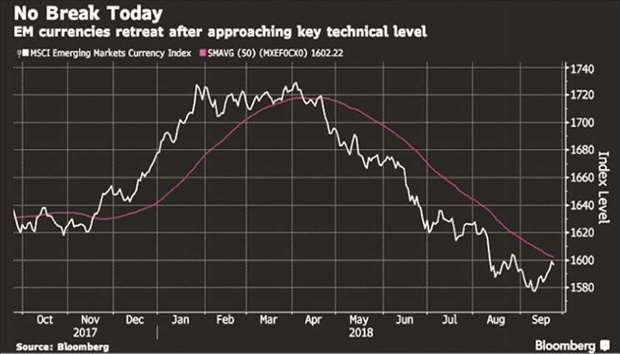Mounting US-China trade tensions and a shadow-banking imbroglio in India are keeping investors on edge yesterday, just as emerging markets showed signs of recovering from seven months of turmoil.
Fresh from a week in which a gauge of developing-nation currencies had its best five-day stint since February as both stocks and bonds advanced, markets are now having to cope with the imposition of levies on another $200bn in Chinese goods and the fallout of missed payments by Mumbai-based IL&FS Group.
Later in the week, traders will focus on interest-rate decisions in Indonesia and the Philippines and the tightening race in Brazil’s election. All this when the Federal Reserve’s September 25-26 meeting will likely provide clues as to how quickly policy makers will push ahead with the removal of stimulus.
“Pressure on EM will remain, as the US-China trade tensions continue to simmer in the background,” said Khoon Goh, the head of research at Australia and New Zealand Banking Group Ltd in Singapore. “US tariffs on Chinese imports have the potential to increase US inflation and how the Fed reacts to this will be important.”
With the yield on 10-year Treasuries holding above 3.05% and Brent crude having surpassed $80 a barrel, “current-account deficit currencies” will remain vulnerable, Goh said.
MSCI Inc’s gauge of developing-nation currencies climbed 0.7 last week, putting it close to breaking above its 50-day moving average. Apart from two days in April, the last time the index crossed that level – in November – it heralded a four-month rally that drove it to a record high. The index retreated yesterday, along with a measure for equities.
US-China tensions
n China dashed prospects for a near-term resolution to the trade war with the US, warning President Donald Trump his threats of further tariffs are blocking any potential negotiations
n A 10% US tariff on about $200bn of Chinese goods takes effect from yesterday, with the duties rising to 25% on January 1
n The risk of tariffs being raised to 25% from January, as announced by Washington, could still be negotiated away through concessions from Beijing over the next few months, according to NatWest Markets
Indonesia, Philippines set to hike
n Investors will monitor rate decisions by the Indonesian and Philippine central banks on Thursday to see if policy makers extend their hiking cycles. Both countries run current-account deficits, making their currencies among the most vulnerable in Asia to the emerging-market sell-off
n Bank Indonesia has been the most hawkish Asian central bank this year, raising its policy rate by a total of 125 basis points since May. It will probably lift it again this week. It’s also burned through about 11% of its foreign reserves since January to stem declines in the rupiah, which has lost more than 8% of its value against the dollar this year
n The Philippines has struggled with inflation that accelerated to 6.4% year-on-year in August. Bangko Sentral ng Pilipinas has delivered 100 basis points of rate increases since May and more tightening looks likely after governor Nestor Espenilla pledged “strong monetary action” at the September 27 meeting
n The Czech Republic’s rate meeting tomorrow is likely to result in an unprecedented third consecutive hike. Governor Jiri Rusnok joined an emerging consensus by saying he saw no reason to delay the move, meaning the focus after the meeting will be on any forward-looking comments
Fed rate path
n With an interest-rate increase from the Federal Reserve already priced in, investors will be seeking clues about the pace of hikes next year and beyond
n The central bank will announce updated economic and financial projections, including its first forecasts for 2021
n The dollar’s strength faltered in the last two weeks, boosting returns for carry-trade investors, who borrow where interest rates are low to buy higher-yielding assets. A Bloomberg currency index that tracks carry-trade returns from eight emerging markets, funded by short positions in the dollar has risen about 3% since reaching a 2 1/2-year low on September 4
Nigeria, Taiwan decide
n Nigeria’s central bank announces its decision on interest rates today in Abuja. All analysts surveyed by Bloomberg forecast that policy makers will hold the key rate at a record high of 14% to bolster the naira and try to counter an acceleration in outflows in recent months amid the emerging-market selloff
n Central bankers in Ghana and Kenya are also likely to keep rates on hold
n Taiwan and Egypt decide on rates on Thursday, while Colombia is likely to hold its benchmark the following day

